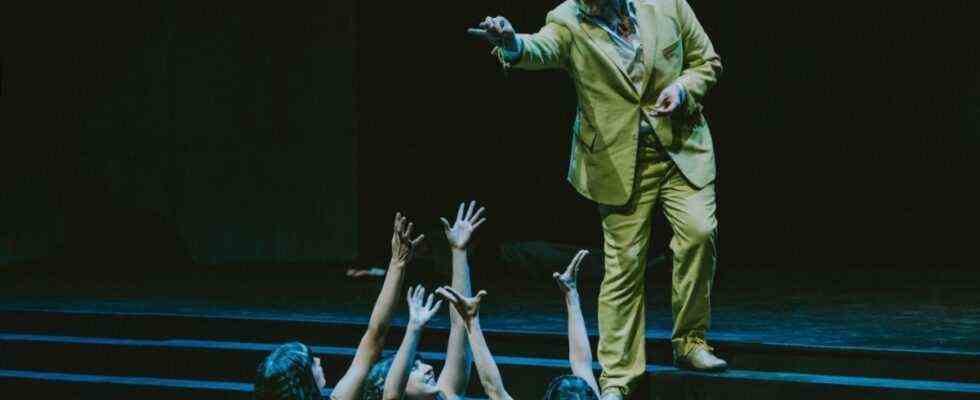When the former star mezzo-soprano Brigitte Fassbaender turned to directing an opera in the 1980s, no one could have guessed how diligently and persistently she would indulge in this new task. It was not the first houses she worked at, and as the artistic director in Innsbruck she was able to place many orders herself, but all in all she remains a considerable oeuvre. For the Festspielhaus in Erl in Tyrol, Fassbaender has now decided on Richard Wagner’s “Rheingold” – in the end it should be the complete ring, which the 82-year-old raved about, a lifelong dream would come true.
This was only partially true for the audience, although the joy at the end was huge and Fassbaender also received a somewhat unsuccessful sculpture, let’s say a trophy, the German Record Critics’ Prize. But you can’t tell from the cheers of the listeners how much of it is directed at the director. You can only close the other way around, if there are hardly any or no boos, it was nice. A slap in the face for most directors who do not want to please, but want to shake up, shake, get carried away, change viewing habits and who knows what everything.
Wotan, the father of the gods, is armed with two rune spears
There was nothing of that in Erl, and they searched in vain for hidden references to the opera’s core theme critical of capitalism, the discourse on power and ultimately the great discourse on violence. Perhaps that was a good thing this time, because what is arousing does not follow any objective law and can also go in the pants from time to time. Nor is it written anywhere how it should be. Fassbaender, for example, had the idea of granting the god father Wotan not only one rune spear, but two. “A novelty in the history of the ring,” wrote the Munich Mercury, a real excitement. Yes, even such an idea can shake people.
But that wasn’t meant at all, Fassbaender just wanted to “ironize”, to make you smile. Her main concern is directing people. So how the singers move on stage, communicate gestural, relate to each other so that the bustle of people turns into a drama. Sometimes this succeeded, but most of the time the director’s experience as a singer slowed down further actions. There was a lot of standing around, but that didn’t bother us, because the singers all offered great things. Even Alberich, the most underrated and misinterpreted character in the opera, who was often involuntarily comical to embarrassing, was excellently cast with Craig Colclough. It was not entirely understandable why he was moaning in the left corner while his tormentor stood many meters away, but he hit the right note between suffering and self-pity. And above all: He avoided anything caricature – the common misinterpretation of this role.
Simon Bailey gave a powerful Wotan, not quite as gloomy as usual, not quite as insecure as necessary, but vocally stable. In contrast, Ian Koziara shone as a negotiating lodge with his gentle, bright tenor, which radiated less cunning than trustworthiness. Which makes the figure much more believable than in the usual interpretation as a devious deceiver. Subtle, but effectively coherent approaches to a more in-depth personal direction in the sense of a basic understanding of Wagner’s characters emerged here. So dramaturgical qualities that precede the actual direction. On the stage itself, however, one experienced a rather dutifully narrated piece that often did not really exhaust the underlying tensions between the actors.
The whispering of the Wagner sound is missing
But maybe it all happened in music? On the one hand, yes, because the score encourages many cross-connections and internal tensions. On the other hand, only to a limited extent, because the conductor of the evening, Erik Nielsen, apparently did not want to overwork the orchestra of the Tyrolean Festival Erl. Perhaps a little more would have been possible after all, because there was hardly any place where one had the impression that the musicians were overwhelmed or unmotivated.
Musically, orchestral and vocally, this evening was a highlight. The fact that the musicians were not sitting in the orchestra pit, but behind a gauze curtain between the stage and the firewall, was strange, but not necessarily a disadvantage. The indirect streaming, the whispering sound of the Wagnerian sound was missing, but you were addressed more or less directly, and above all: all the details were retained. Especially in the many quieter places – a fortissimo was often not necessary in this constellation, and when it did, the sound remained big and round and made the listener more accustomed to it than it did with volume.
The crucial questions, then, does Erl need a “ring”, and does Erl need the “ring”, can be answered after this evening with a ponderous “definitely”.

